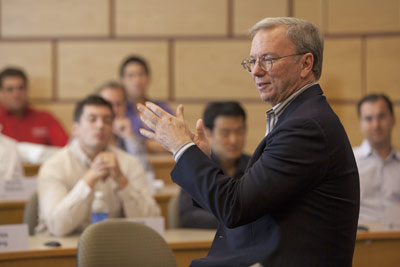Google's Schmidt: Students will provide pulse, heart of technology's future
By Susan Kelley

The world will be a better place sooner than one might think, as innovations in technology improve our lives and the lives of others around the world in unfathomable ways, according to Eric Schmidt, executive chairman of Google Inc.
Schmidt said he is jealous of young people today, who are leading their elders to future technology. "This generation, your generation, is the first fully connected generation the world has ever known. ... if you are awake, you're online. And you're probably texting your friends right now," he quipped.
Schmidt spoke Sept. 20 as Cornell's 31st Hatfield Fellow in Economic Education to a packed house in Statler Auditorium. The Hatfield Fellowship is the highest honor Cornell bestows on individuals from the corporate sector and serves as a platform for exchange of ideas between the academic and corporate communities.
While computer networks and other technologies have come with downsides -- from a shift of capital to elites and the loss of traditional media systems -- they far more often have solved problems, he said. For example, universal language translation is an enormous accomplishment that aids in peacekeeping, he said.
In the immediate future, investments should be made into such technology projects as global asset tracking, which would help law enforcement agencies halt money laundering and corruption. Competing government services, and giving people the chance to choose between them, would increase efficiency and decrease costs. And establishment of a "culture of fact" would help keep politicians and governments accountable, he said. "When you see a debate, demand a follow-up analysis of the truth ... [to] decide whether political leaders are misleading you," he said.
As much as technology is changing our world, he said, "the future will come sooner and be stranger than any of us think right now." That future is right around the corner, he said, with technology that enables our beds to sense when we are waking up and to cue the coffee pot to start brewing and project our emails and news headlines onto our bedroom walls. Driverless cars will ferry us around.
Perhaps most important, technology will bring health problems under control. Pills already exist that contain microscopic sensors that monitor one's health and send alerts to patients and doctors about imminent health risks, he said.
In 10 to 15 years, globalization and innovation will put enormous pressure on traditional government systems, in what is known in the technology sector as a "forced upgrade." Autocratic governments will do worse as information leaks and ferments change, Schmidt said. And developing countries will be better able to establish competitive economic advantages.
In 20 to 30 years, technology will just "disappear," he predicted, as people spend less time trying to get technology to work. Technology will be all around us, as invisible and crucial as electricity. "In that sense, the Web will be nothing and it will be everything," he said.
As powerful as the technology of the future will be, it will lack one thing: a heart. "All of these connections that you forge, the digital ties that bind our humanity together, aren't possible without technology. But it's also not possible without you, and more importantly, without a heart. You provide the pulse, if you will, for this technology platform of the future," he said.
President David Skorton introduced Schmidt and mentioned two of Cornell's links to Google: Schmidt is one of three advisers who recently joined the steering committee of Cornell NYC Tech, and Google has provided Cornell NYC Tech with office space in the heart of Manhattan as Cornell prepares its campus on Roosevelt Island.
While on campus, Schmidt also spoke at management professor David BenDaniel's class on entrepreneurship and business ownership at the Samuel Curtis Johnson Graduate School of Management, and he met with a small group of faculty members to discuss technology and technology education, including Cornell NYC Tech.
Media Contact
Get Cornell news delivered right to your inbox.
Subscribe